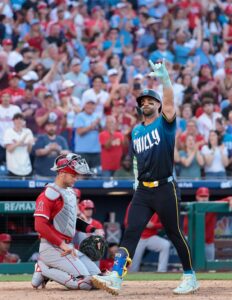7:33pm: Major League Baseball’s Joint Competition Committee voted 9-2 to approve the ABS challenge system, Bob Nightengale of USA Today reports. All six owners and three of the four players voted in favor of the change. One of the players and the lone umpire on the committee voted against.
12:52pm: As expected, the ABS challenge system has been approved, per an MLB announcement.
11:50am: Major League Baseball’s Joint Competition Committee will meet today to vote on the implementation of the Automated Ball-Strike system for the 2026 season, Joel Sherman of the New York Post reports. The 11-person committee — comprised of six owners, four players and one umpire — is expected to approve the ABS system for next year.
It’ll be a radical shift to the game’s identity — one that many fans feel is overdue but many others oppose with fervor. The strike zone will not be fully automated if and when the ABS system is approved. Rather, the challenge system that has been used in the minor leagues, during spring training and during this year’s All-Star Game will be in place.
Under the incoming ABS system, any pitcher, catcher or hitter will be able to tap his helmet or cap to signify his desire to challenge a ball or strike call from the home plate umpire. Teams are afforded two challenges per game but are only docked a challenge if it is unsuccessful. Once a team has two unsuccessful challenges, they’ll be out of challenges for the remainder of the game. In theory, there’s no limit to the number of successful challenges a team could go through in a game. Challenges must come immediately after a ball/strike call is made; the dugout cannot have the team’s replay coordinator review the pitch and call for a challenge 10 to 15 seconds after the pitch was delivered, for instance. The challenge result will be shown on the on the scoreboard immediately after a challenge is granted.
For many players, this system will be second-nature. The ABS system was first implemented in the low minors back in 2021. It’s been standard at the Triple-A level since 2022. More veteran players got their first taste of it during spring training 2025 and will have all of the 2026 spring schedule to acclimate to the changes. As with any notable change, there will be some hurdles and probably some hiccups in the adoption, but the league’s hope is surely that — much like the pitch clock and, to a lesser extent, instant replay — it will quickly become a fairly seamless integration.

